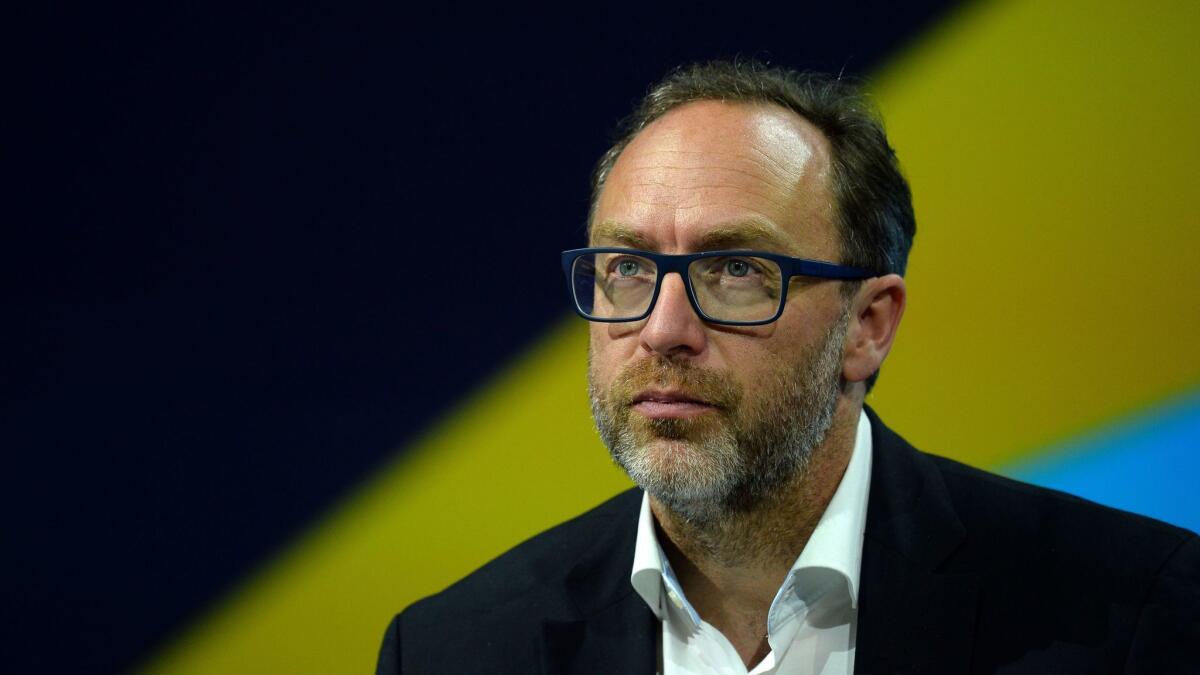Wikipedia co-founder Jimmy Wales says he has a plan to fix fake news

The latest effort in the battle against fake news comes from Wikipedia co-founder Jimmy Wales, who announced plans this week for an online news publication he says will be written by professional journalists, edited by volunteer fact-checkers and supported by readers who care enough to donate money.
The name, like the concept, is a meld of old and new world journalism: WikiTribune.
The goal is to produce “fact-based articles that have a real impact in both local and global events,” according to the website where Wales is crowd-funding the project.
After a U.S. presidential race in which facts and fiction mixed freely and the messengers were attacked as frequently as the messages, the tech world has been forced to confront its complicity in the proliferation of misinformation, which has eroded public trust in news organizations.
Facebook, Google and other online platforms that produce no news content of their own present themselves as neutral sites that enable people to make connections and share what is meaningful to them. They have resisted the argument that they have a responsibility to exercise editorial control over the information they deliver to billions of users.
But that position has become increasingly untenable in light of some of the patently false claims that flourished on social media during the election. For the record, Pope Francis never endorsed Donald Trump, and top Democrats weren’t operating a child sex trafficking ring out of a Washington pizzeria.
Facebook founder Mark Zuckerberg downplayed the notion that such hoaxes affected the outcome of the election. “Of all the content on Facebook, more than 99% of what people see is authentic,” he wrote in a post in November. “The hoaxes that do exist are not limited to one partisan view, or even to politics.”
He acknowledged that more could be done to encourage users to report inaccurate content, but said, “We must be extremely cautious about becoming arbiters of truth ourselves.”
Since the election, Facebook and Google have made adjustments to the algorithms that control what information surfaces on their platforms. They have rolled out tools that use third-party fact-checking sites, such as PolitiFact.com or Snopes.com, to flag articles containing questionable assertions. And they have revised their policies on advertisement placement to avoid channeling revenue to purveyors of “fake news.”
Ultimately, however, they leave it to users to decide what information to trust and share.
Enter Wales, who in 2001 helped launch Wikipedia, which now boasts more than 5 million articles on the English-language site alone, covering nearly any subject imaginable.
The articles are produced by an army of volunteer writers and editors who keep a close eye on entries they care about and frequently engage in passionate debates about what should and should not be included.
Wales said he had been contemplating a site like WikiTribune for some time but was spurred to act when he heard President Trump’s advisor Kellyanne Conway defend the White House’s inflated claims about the size of the inauguration crowd as “alternative facts.”
“Are you kidding me?” Wales said to Wired magazine. “We have to do something about this.”
Professional journalists will write WikiTribune articles, providing links to their sources and publishing their interviews in full — an attempt to improve on the accuracy of Wikipedia, which for all its success still includes enough incomplete or erroneous entries that college professors warn their students not to use it as a source.
Borrowing Wikipedia’s core belief in the power of a crowd, readers will be asked to vet the articles to help ensure they are factual and neutral. But their revisions will only be published if a staff member or trusted community volunteer approves them, Wales said in an interview with the BBC.
Readers will also have the ability to set the news agenda.
“If you can get together a certain number of people who are interested in Bitcoin [for example] and you flag that when you sign up as a monthly supporter, then we’ll hire a Bitcoin person to do the beat full time,” Wales told the BBC. “But it is going to be neutral. They can’t pick their favorite hack, who pumps forward their agenda.”
Wales wants the content on WikiTribune to be delivered free of charge and unencumbered by advertising, which he believes has accelerated a “race to the bottom” by encouraging media organizations to pursue stories that will get them the most clicks.
Instead, the site is asking supporters to contribute $15 a month, although any donation is welcome.
As of Thursday morning, the site had racked up more than 6,800 supporters — enough to hire four of the 10 full-time journalists Wales hopes to employ initially. The site did not say how much they will be paid.
Media analysts tend to be skeptical of Wales’ claim to have figured out how to fix the problem of fake news.
“They’re hiring 10 reporters. This is not going to fix journalism,” said Kyle Pope, editor in chief of the Columbia Journalism Review.
Still, he said, “I’m really hesitant to say this is a dumb idea because Wikipedia turned out to be so brilliant … I just hope we can cream off the best ideas and not get too invested in how are we going to institute this across the media business.”
Part of the challenge is that the very concept of fake news is so nebulous.
“Are we talking about Macedonian teenagers who are churning out stuff that is 100% wrong to create clicks and get advertising?” Pope asked. “Are we talking about the sort of right-wing echo system of half-right, half-wrong news? Are we talking about Russian state propaganda?”
WikiTribune “would only address a very small subset of that,” he said.
For many in the news business, the issue is less about how to generate factual information — there are organizations that have been doing that for decades — but how to win back public trust.
In a survey by the Pew Research Center last year, just 18% of respondents indicated that they had a lot of trust in the information they got from national news organizations.
Pope does not attribute that to factual errors so much as to a perception that media coverage tends to favor one side or another and important parts of the story aren’t being told — concerns he believes are legitimate.
Robert Hernandez, an expert on Web journalism at the USC Annenberg School for Communication and Journalism, said he believed the success of WikiTribune would depend in part on whether the community it is trying to build “feels they have a voice and an ally fighting for them.”
“If they feel that they have a partner there, I do believe that they will be willing to step up,” he said, “just like I do as an NPR member.”
But he cautioned that there was more to producing a successful new publication than being able to come up with facts.
“From design to quality of content, there’s a lot of challenges,” he said. “Facts are not enough.”
Twitter: @alexzavis
ALSO
Uber’s plan to curb bad behavior by passengers: Reveal their ratings
Palantir will pay $1.7 million to settle claims it discriminated against Asians
TeleSign, a Marina del Rey start-up crucial to integrity of popular apps, purchased for $230 million
UPDATES:
10:45 a.m.: This article was updated with the number of supporters increasing to more than 6,800, enough to hire four journalists.
This article was originally published at 5 a.m.
More to Read
Sign up for Essential California
The most important California stories and recommendations in your inbox every morning.
You may occasionally receive promotional content from the Los Angeles Times.











